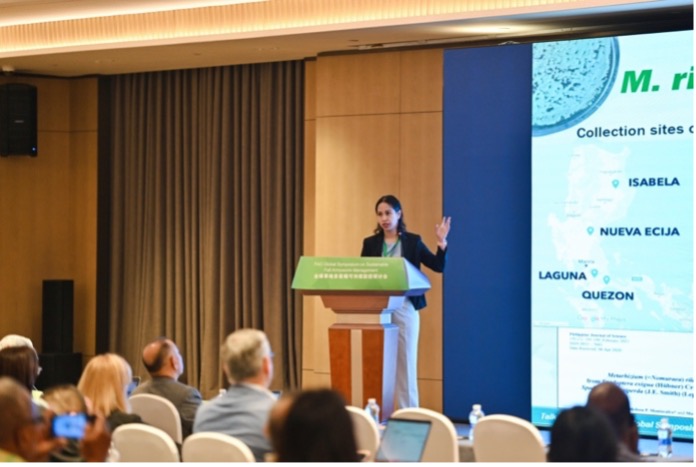Ms. Montecalvo sharing their work on natural enemies of fall armyworm in the Philippines.
The Food and Agriculture Organization (FAO) of the United Nations’ Plant Production and Protection Division organized a Global Symposium on Sustainable Fall Armyworm (FAW) Management from October 31 to November 2 at the Empark Grand Hotel in Beijing, China.
With the theme “Charting a global response to future invasive pests”, stakeholders from various countries gathered to facilitate worldwide dissemination of results and lessons learned to improve the global response against FAW and other invasive plant pests and diseases.
Over 200 participants from 45 countries including national authorities, academia, researchers and scientists, extension professionals, and policy-makers participated in the three-day event.
Ms. Melissa P. Montecalvo, a researcher from the National Crop Protection Center (NCPC), shared the status and future initiatives on natural enemies of FAW in the Philippines.
The paper on beneficial microbes, parasitoids, and predators is a collaborative effort among scientists of the College of Agriculture and Food Science including Dr. Barbara L. Caoili, Randolph N. Candano, Marie Joy B. Beltran, Normandy M. Barbecho and Sci. Marcela M. Navasero from the NCPC and Dr. Jessamyn R. Adorada from the Institute of Weed Science, Entomology and Plant Pathology.
Meanwhile, Dr. Peter M. Madaraog, division chief of the Crop Pest Management Division of the Department of Agriculture-Bureau of Plant Industry, also presented the highlights of accomplishments in the Philippines as one of the demonstration countries on sustainable FAW management.
FAW is a highly migratory and invasive insect pest that has been causing massive losses in maize fields and other staple crops globally. In the Philippines, this insect pest was first recorded infesting corn in 2016 and rapidly spread throughout the corn fields in the country. Recently, this insect pest has also been reported to cause damage to rice and sugarcane.
The Chinese Academy of Agricultural Sciences (CAAS) and the National Agro-Teach Extension and Service Centre (NATESC) of the Ministry of Agriculture and Rural Affairs (MARA) co-organized the symposium featuring presentations and field tour. During the symposium, thematic sessions covered significant factors in sustainably mitigating FAW including a) prevention and preparedness; b) monitoring and early warning; c) FAW management in the tropics; and d) FAW management in the temperate zones. The enabling environment and farmer extension were also discussed during the event.
The participants also visited the laboratory and facility at the Institute of Plant Protection (IPP)-CAAS and Genebank of CAAS in Beijing, China. The IPP-CAAS showcased their products and technologies for crop protection.
A proceeding will be published in early 2024 to feature the presentations, discussions, and calls to action during the symposium. Strengthening critical capacities to develop and adopt innovations and regulations, improving socio-ecological resilience in agri-food systems, and involving farmers are some of the ways forwarded by the symposium. (First published in the Aggie Green & Gold newsletter, November 2023 issue)








